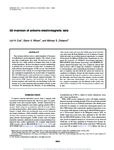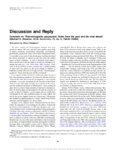TO
| Creator | Title | Description | Subject | Date | ||
|---|---|---|---|---|---|---|
| 1 |
 | Zhdanov, Michael S. | 3-D magnetic inversion with data compression and image focusing | We develop a method of 3-D magnetic anomaly inversion based on traditional Tikhonov regularization theory. We use a minimum support stabilizing functional to generate a sharp, focused inverse image. An iterative inversion process is constructed in the space of weighted model parameters that acce... | 2002-01-01 | |
| 2 |
 | Zhdanov, Michael | 3D inversion of airborne electromagnetic data | Time-domain airborne surveys gather hundreds of thousands of multichannel, multicomponent samples. The volume of data and other complications have made 1D inversions and transforms the only viable method to interpret these data, in spite of their limitations. We have developed a practical methodolog... | 2012-01-01 | |
| 3 |
 | Brown, Francis Harold | A summary of the geology, geochemistry, and geophysics of the Roosevelt Hot Springs thermal area, Utah | 1978 | ||
| 4 |
 | Furse, Cynthia M.; Cherkaev, Elena A. | Cross-borehole delineation of a conductive ore deposit in a resistive host-experimental design | The finite-difference time-domain method is used for high-resolution full-wave analysis of cross-borehole electromagnetic surveys of buried nickel sulfide deposits. The method is validated against analytical methods for simple cases, but is shown to be a valuable tool for analysis of complicated ... | Finite-difference time-domain; FDTD; Cross-borehole; Electromagnetic surveys; Nickel sulfide deposits; Conductive ores; Resistive host | 2001-01-01 |
| 5 |
 | Zhdanov, Michael | Cross-well electromagnetic imaging in three dimensions | In this paper, we develop a new technique for 3D cross-well electromagnetic tomography, based on an EM borehole survey consisting of a moving vertical magnetic dipole transmitter, located in one or several boreholes, and a tri-axial induction receiver, located in the other boreholes. The method is b... | cross-well; three-dimensional; tomography; electromagnetic; localized quasi-linear approximation; grouping | 2003 |
| 6 |
 | Zhdanov, Michael | Discussion and reply: comments on "electromagnetic geophysics: notes from the past and the road ahead" | The direct current and electromagnetic methods have been around for almost 180 years and have been applied successfully in mining, petroleum, geotechnical, engineering, environmental, groundwater, and tectonic studies. Over such a long period of time, it is possible to lose track of who the pioneers... | 2012-01-01 | |
| 7 |
 | Zhdanov, Michael S. | Electromagnetic inversion using quasi-linear approximation | Three-dimensional electromagnetic inversion continues to be a challenging problem in electrical exploration. We have recently developed a new approach to the solution of this problem based on quasi-linear approximation of a forward modeling operator. It generates a linear equation with respect to ... | Quasi-linear approximation; electromagnetic inversion | 2000 |
| 8 |
 | Zhdanov, Michael S. | Focusing geophysical inversion images | A critical problem in inversion of geophysical data is developing a stable inverse problem solution that can simultaneously resolve complicated geological structures. The traditional way to obtain a stable solution is based on maximum smoothness criteria. This approach, however, provides smoothe... | focusing; geophysical inversion images; minimum gradient support functionals; MGS | 1999 |
| 9 |
 | Chapman, David S.; Picard, M. Dane | Heat flow in the Uinta Basin determined from bottom hole temperature (BHT) data | The thermal resistance (or Bullard) method is used to judge the utility of petroleum well bottom-hole temperature data in determining surface heat flow and subsurface temperature patterns in a sedimentary basin. Thermal resistance, defined as the quotient of a depth parameter AZ and thermal con... | thermal analysis; bottom hole temperature | 1984-04 |
| 10 |
 | Zhdanov, Michael S. | Integral equation method for 3D modeling of electromagnetic fields in complex structures with inhomogeneous background conductivity | We present a new formulation of the integral equation (IE) method for three-dimensional (3D) electromagnetic (EM) modeling in complex structures with inhomogeneous background conductivity (IBC). This method overcomes the standard limitation of the conventional IE method related to the use of a horiz... | 3-D modeling; integral equation method; marine controlled-source electromagnetic data; MCSEM; gemini prospect; Gulf of Mexico | 2006 |
| 11 |
 | Chapman, David S. | Inversion of bottom-hole temperature data: the Pineview field, Utah-Wyoming thrust belt | The present day temperature field in a sedimentary basin is a constraint on the maturation of hydrocarbons; this temperature field may be estimated by inverting corrected bottom-hole temperature (BHT) data. Thirty-two BHTs from the Pineview oil field are corrected for drilling disturbances by a Ho... | Thermal analysis; bottom hole temperature; inversion; Pineview oil field | 1988-05 |
| 12 |
 | Zhdanov, Michael | Large-scale 3D inversion of marine magnetotelluric data: Case study from the Gemini prospect, Gulf of Mexico | Three-dimensional magnetotelluric (MT) inversion is an emerging technique for offshore hydrocarbon exploration. We have developed a new approach to the 3D inversion of MT data, based on the integral equation method. The Tikhonov regularization and physical constraint have been used to obtain a stab... | 2011 | |
| 13 |
 | Zhdanov, Michael S. | Localized S-inversion of time-domain electromagnetic data | Interpretation of time-domain electromagnetic (TDEM) data over inhomogeneous geological structures is a challenging problem of geophysical exploration. The most widely used approach of interpreting TDEM data is based on the smooth 1-D layered resistivity inversion. We have developed an effective t... | 2002-01-01 | |
| 14 |
 | Chapman, David S. | Monitoring aquifer recharge using repeated high-precision gravity measurements: a pilot study in South Weber, Utah | Repeated high-precision gravity surveys were conducted over two infiltration cycles on an alluvial-fan aquifer system at the mouth of Weber Canyon in northern Utah as part of the Weber River Basin Aquifer Storage and Recovery Pilot Project (WRBASR). Gravity measurements collected before, during, an... | Aquifer recharge; Gravity measurements; Infiltration ponds; Weber River Basin Aquifer Storage and Recovery Pilot Project | 2008 |
| 15 |
 | Zhdanov, Michael S. | New approach to interpretation of airborne magnetic and electromagnetic data | We present a new technique for underground imaging based on the idea of space-frequency filtering and downward continuation of the observed airborne magnetic and electromagnetic data. The technique includes two major methods. The first method is related to the downward analytical continuation and ... | 1996-01-01 | |
| 16 |
 | Zhdanov, Michael S. | Novel approach to the model appraisal and resolution analysis of regularized geophysical inversion | The existing techniques for appraisal of geophysical inverse images are based on calculating the model resolution and the model covariance matrices. In some applications, however, it becomes desirable to evaluate the upper bounds of the variations in the solution of the inverse problem. It is possib... | Geophysical inversion; electromagnetic modeling; cauchy inequality; resolution analysis; lanczos decomposition method; SLDM; voisey's Bay; 3-D modeling | 2006 |
| 17 |
 | Zhdanov, Michael S. | Parameter estimation for 3-D geoelectromagnetic inverse problems | Parameter estimation in geoelectromagnetics aims to obtain the most important parameters of a well-defined conductivity model of the Earth. These parameters are features of typical geological structures, such as depth and size of conductive or resistive targets, angle of dike inclination and its le... | 1999-01-01 | |
| 18 |
 | Zhdanov, Michael S. | Quasi-analytical approximation and series in electromagnetic modeling | The quasi-linear approximation for electromagnetic forward modeling is based on the assumption that the anomalous electrical field within an inhomogeneous domain is linearly proportional to the background (normal) field through an electrical reflectivity tensor ˆλ. In the original formulation of... | Electromagnetic modeling; quasi-linear approximation; quasi-analytical approximation; quasi-analytical series | 2000 |
| 19 |
 | Zhdanov, Michael S. | Quasi-linear approximation in 3-D electromagnetic modeling | The Born approximation in electromagnetic (EM) numerical modeling has limited application for solving 3-D electromagnetic induction problems, because in structures with high conductivity contrasts and at high frequencies, this approximation is inaccurate. In this paper, we develop a new and rel... | 1996-01-01 | |
| 20 |
 | Zhdanov, Michael | Resistivity imaging by time domain electromagnetic migration (TDEMM) | One of the most challenging problems of electrical geophysical methods is the interpretation of time domain electromagnetic (TDEM) sounding data in the areas with the horizontally inhomogeneous geoelectrical structures. This problem is of utmost importance in mining exploration and environmental stu... | 1995 | |
| 21 |
 | Zhdanov, Michael S. | Rigorous 3D inversion of marine CSEM data based on the integral equation method | Marine controlled-source electromagnetic (MCSEM) surveys have become an important part of offshore petroleum exploration. However, due to enormous computational difficulties with full 3D inversion, practical interpretation of MCSEM data is still a very challenging problem. We present a new approach ... | 2007 | |
| 22 |
 | Chapman, David S.; Harris, Robert N. | Stop-go temperature logging for precision applications | We describe a new field procedure for stop-go temperature logging of boreholes that attains millikelvin precision. Temperature is recorded continuously throughout the entire log, but the logging probe is held stationary for a fixed time at discrete depth intervals. Equilibrium temperatures at the di... | Temperature logging; boreholes; stop-go logging method | 2007 |
| 23 |
 | Chapman, David S. | Techniques, analysis, and noise in a Salt Lake Valley 4D gravity experiment | Repeated high-precision gravity measurements using an automated gravimeter and analysis of time series of 1-Hz samples allowed gravity measurements to be made with an accuracy of 5 μGal or better. Nonlinear instrument drift was removed using a new empirical staircase function built from multiple ... | Gravity measurements | 2008 |
| 24 |
 | Chapman, David S. | Thermal analysis of the southern Powder River Basin, Wyoming | Temperature and geologic data from over 3000 oil and gas wells within a 180 km x 30 km area that transect across the southern Powder River Basin in Wyoming, U.S.A., were used to determine the present thermal regime of the basin. Three-dimensional temperature fields within the transect, based on... | Thermal analysis; inversion; bottom hole temperature | 1996-11 |
| 25 |
 | Mcpherson, Brian James; Chapman, David S. | Thermal analysis of the southern Powder River Basin, Wyoming | Temperature and geologic data from over 3000 oil and gas wells within a 180 km x 30 km area that transect across the southern Powder River Basin in Wyoming, U.S.A., were used to determine the present thermal regime of the basin. Three-dimensional temperature fields within the transect, based on... | 1996 |
